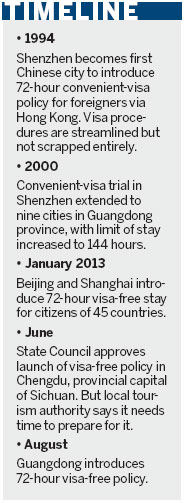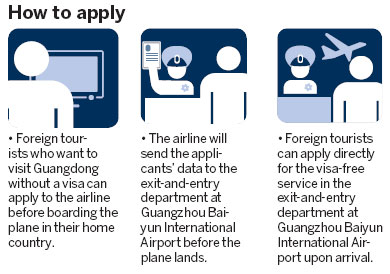Guangzhou to launch 72-hour visa-free stays
Updated: 2013-07-29 15:03
By Zheng Caixiong in Guangzhou, Zhao Yinan in Tianjin and Shi Yingying in Shanghai (China Daily)
|
|||||||||||

City to follow Beijing and Shanghai in introducing convenient policy
Guangzhou is to allow transit passengers 72-hour stays from August, the third Chinese city to introduce the visa-free policy.
Travelers from 45 countries, who intend to visit a third country and who hold air tickets, will be able to stay in the Guangdong provincial capital for three days without a visa and will be allowed to visit anywhere in the province during their trips.
Guangzhou is following Beijing and Shanghai in introducing the visa-free stays, which cover visitors from countries including France, Germany, the United States and Japan.
Zhao Yufang, deputy governor of Guangdong, said on Tuesday that Guangzhou is expecting more foreign visitors after the policy is introduced.
She promised to continue simplifying exit and entry procedures and to improve traveler-friendly facilities and the shopping environment.
"The visa-free policy will cement Guangzhou's status as a key metropolis of China, an international aviation hub and a world-renowned tourist destination," she said.
Yang Rongsen, director of the Guangdong Tourism Administration, sees the policy as a boon for tourists and the province. "It will help boost the tourism industry," Yang said.
Zhang Yumin, general manager of Guangzhou Baiyun Airport Co, said the airport will see 1 million transit passengers this year, rising to more than 1.5 million in 2015.
It will join Shanghai Pudong International Airport and Beijing Capital International Airport as the country's top entry points for foreigners.

Chen Baiyu, president of GZL International Travel Service, said the policy will benefit not only Guangzhou, but also other cities in the province.
An official from Window of the World, a leading attraction in Shenzhen, speaking on condition of anonymity, said the tourist spot expects the new policy to draw more visitors from Europe and the US.
About 20 percent of its visitors are foreigners.
Jill Collins, Australia consul-general in Guangzhou, said, "The visa policy will encourage more Australians to come and experience Cantonese morning tea, go up the colorful Canton Tower and enjoy the sun as it rises over Guangzhou's Baiyun Mountain."
Kevin McGeary, 29, from Northern Ireland, said the visa-free policy is even more useful for visiting family members and for having short holidays.
"Business travelers on a short trip to China, for example attending the Canton Fair or visiting factories, will be glad that the policy saves them the trouble of going through complicated visa application procedures," said McGeary, who works for a newspaper in Shenzhen. The Canton Fair is China's largest trade fair.
Many other Chinese cities are expected to introduce visa-free visits.
The State Council recently granted approval for Chengdu, the provincial capital of Sichuan, to become the first city in western China to launch 72-hour visa-free stays, but local authorities say they need time to prepare before the policy can be introduced.
In May, Tianjin said it has applied to launch the policy, but is still awaiting central government approval.
Chao Xiaohui, an official in charge of inbound tourism with the Shanghai tourism administration, said the visa-free policy introduced in the city in January benefited 5,700 people in the first six months of 2013. The most visitors came from the United States, with Australians in second place.
"Most of them were individual travelers and a lot were business travelers," she said.
Beijing introduced the 72-hour visa-free policy for visitors from 45 countries on Jan 1.
The capital's tourism authority said the exact number of travelers benefiting from the policy is still unclear, but the city is expecting about 2 million overseas visitors on transit visas in 2013.
Ma Yiliang, a researcher at the China Tourism Academy, said although the number of foreigners applying for visa-free stays has increased in major cities, it accounts for a small proportion of total foreign arrivals.
He said China must promote the policy overseas so that travelers can plan their trips before arriving in the country.
Ma said the policy so far has been symbolic, rather than bringing significant changes to the country's inbound tourism industry.
He also suggests that authorities introduce visas that allow longer stays, to attract overseas travelers.
China received about 12.8 million foreign tourists in the first half of this year, 5 percent down on a year ago, according to the exit-entry authority under the Ministry of Public Security.
Related Stories
EU eyes flexible visa rules for Chinese tourists 2013-07-22 15:38
Beijing visa-free tourists allowed to retrieve prohibited goods 2013-05-31 10:14
Visa-free policy in Shanghai draws 3,800 visitors this year 2013-05-16 07:55
Wuxu airport can issue arrival visas 2013-05-09 13:59
Visa policy to attract global tourists 2013-05-08 09:24
Today's Top News
China warily eyes Japan's SE Asia buying binge
Financial guru looks to nation's future
Officers suspended after alleged beating
Mental health care falls short
Deliveries up as mercury rises
Audit targets local government debt
Xi's speech underlines commitment to reform
Brain drain may be world's worst
Hot Topics
Lunar probe , China growth forecasts, Emission rules get tougher, China seen through 'colored lens', International board,
Editor's Picks

|

|

|

|

|

|





